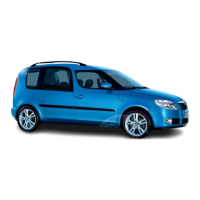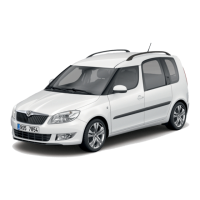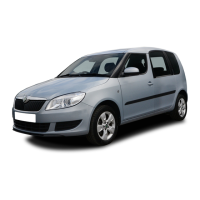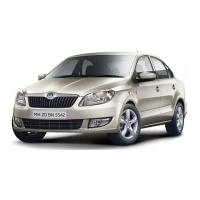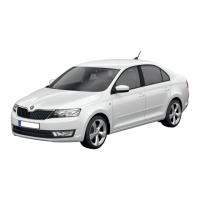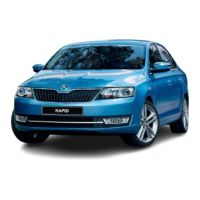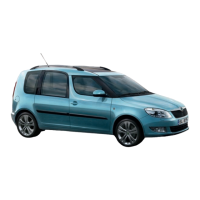
Do you have a question about the Skoda ROOMSTER - 03-2010 and is the answer not in the manual?
| Brand | Skoda |
|---|---|
| Model | ROOMSTER - 03-2010 |
| Category | Automobile |
| Language | English |
Describes the included on-board documentation: Owner's Manual, Service schedule, and Help on the road.
Explains what the Owner's Manual covers and its purpose for the user.
Explains how the manual's text is divided into sections and chapters for easy navigation.
Details the meaning of symbols used for equipment and the different types of notes.
Provides a visual guide to the vehicle's cockpit layout, including instruments and controls.
Explains the instrument cluster, gauges, warning lights, and indicators.
Details how to unlock and lock the vehicle using keys and remote controls.
Covers manual control of exterior and interior lights, and visibility features.
Describes seat adjustments and the various storage solutions available.
Explains the operation of heating, ventilation, and air conditioning systems.
Covers basic driving operations like steering wheel adjustment and ignition.
Details the operation of the automatic gearbox, including modes and parking.
Explains the use of the multifunction steering wheel for radio, navigation, and phone.
Explains passive safety measures designed to protect occupants during accidents.
Provides fundamental information and tips for operating the vehicle.
Instructions on how to adjust the steering wheel for optimal driver positioning.
Explains how to adjust the seat belt height for proper fit and comfort.
Details the process for adjusting the driver and front passenger seats.
Explains the functions of the turn signal and main beam lever.
Details the operation of the windshield wiper lever for various modes.
Covers the operation of power windows, including convenience and safety features.
Step-by-step guide on how to open, close, and use the fuel filler flap.
Explains how to release the bonnet and inspect the engine oil level.
Provides a general overview of the instrument cluster layout and its components.
Explains the function of the speedometer, fuel gauge, and coolant temperature gauge.
Explains trip counters, total distance, and the service interval reminder system.
Details the onboard computer's functions like outside temperature and fuel consumption.
Covers the Maxi Dot display's information and control capabilities.
Provides a comprehensive guide to all warning lights and their meanings.
Explains the use of vehicle keys and remote controls, including battery replacement.
Describes the function and operation of the vehicle's immobiliser system.
Details the central locking system for doors and boot lid, including convenience features.
Explains the operation, activation, and deactivation of the anti-theft alarm system.
Covers systems that detect interior movement and trigger the alarm.
Explains how to operate power windows, including convenience and safety features.
Explains the operation of headlights, turn signals, fog lights, and parking lights.
Details the cornering light function for improved illumination in turns.
Explains the functionality of windshield wipers and the automatic wash system.
Covers adjustment of interior and exterior mirrors, and sun visor usage.
Details how to adjust front seats for comfort, safety, and heating.
Covers proper adjustment and importance of head restraints for safety.
Explains how to adjust and fold rear seats for cargo or passenger access.
Information on loading, securing cargo, and using lashing points.
Describes the use and installation of the variable loading floor and cover.
Step-by-step guide for installing a bicycle holder in the luggage compartment.
Details cup holders, ashtray, and other storage solutions within the cabin.
Lists and describes various storage compartments throughout the vehicle.
Explains operation of air vents and the function of the recirculated air mode.
Details how to operate the heating system for temperature and airflow.
Explains the features and operation of the semi-automatic climate control.
Details the fully automatic climate control system for optimal comfort.
Instructions for adjusting the steering wheel for optimal driver positioning.
Explains the functions of the ignition lock positions for engine and steering.
Step-by-step guide on how to start the engine, including safety precautions.
Proper procedure for shutting down the engine safely.
Guidance on shifting gears in a manual transmission for optimal performance.
Instructions for correctly applying and releasing the vehicle's handbrake.
Details the function and activation of the parking aid sensors and their limitations.
Explains how to set, change, and switch off the cruise control system.
Information specific to driving with the 6-speed automatic transmission.
Describes the function of each selector lever position (P, R, N, D, S).
Explains the automatic selector lever lock and its safety function.
Details how to use the kickdown function for enhanced acceleration.
Describes how the gearbox automatically adapts shift points to driving style.
Instructions for manually shifting gears using the Tiptronic feature.
Covers emergency modes and selector lever unlocking procedures.
Explains how to operate radio, navigation, and phone functions via the steering wheel.
Covers connecting mobile phones and using the hands-free system via Bluetooth.
Details managing phone contacts and making calls through the vehicle system.
Explains how to use voice commands to operate the telephone system.
Describes how to connect external audio devices like MP3 players.
Explains passive safety systems designed to protect occupants during accidents.
Provides tips for safe driving habits and occupant behavior.
Lists key safety components like seat belts, airbags, and child seat anchorages.
Essential checks to perform before starting the journey for vehicle safety.
Detailed instructions on achieving the optimal seated position for all occupants.
Information on seat belt function, importance, and correct usage procedures.
Introduces the airbag system, its components, and deployment conditions.
Covers the function and protective benefits of front, side, and head airbags.
Information on when and how to deactivate airbags, including the passenger airbag switch.
Essential guidelines for safely transporting children in the vehicle.
Crucial safety information, usage guidelines, and classification of child safety seats.
Step-by-step instructions for installing child seats using ISOFIX and Top Tether systems.
Explains ESP's role in maintaining vehicle stability and control.
Details how TCS prevents wheel spin during acceleration.
Explains EDL's function in preventing individual wheel slippage.
Discusses factors affecting braking performance, including wear and weather.
Explains the function of the brake booster and the Antilock Brake System.
Details systems that assist braking and starting on inclines.
Covers the operation and characteristics of the power steering system.
Explains the tyre pressure monitoring system and its basic settings.
Details the function, maintenance, and warnings related to the diesel particle filter.
Provides procedures for running in a new engine during the initial 1500 km.
Emphasizes correct operation for emission control and vehicle longevity.
Offers tips for saving fuel, reducing emissions, and minimizing vehicle wear.
Explains how proper shifting techniques improve fuel efficiency.
Advises against unnecessary idling and short journeys for better efficiency.
Details design measures and materials chosen for environmental protection.
Provides precautions to avoid vehicle damage when driving through water.
Outlines necessary technical specifications for towing devices and vehicle compatibility.
Key maintenance points to consider when towing a trailer.
Guidance on distributing load and adjusting tyre pressure for towing.
Advises on safe driving practices and speed limits while towing.
Covers washing, waxing, and general cleaning of the vehicle's exterior.
Provides guidance on cleaning interior surfaces like plastics, leather, and upholstery.
Information on wheels, tyres, their maintenance, and safety checks.
Provides advice on fitting and using winter tyres, including speed restrictions.
Advises on fitting accessories and using Škoda Genuine Accessories and original parts.
Warns about potential issues from unprofessional technical changes.
Details specific information for vehicles classified as category N1.
Covers proper storage and accessibility of the first-aid kit and warning triangle.
Details the usage, checking, and maintenance of the fire extinguisher.
Lists the components included in the vehicle tool kit and their storage.
Explains how to access and use the spare wheel, including tyre pressure checks.
Covers the use of the tyre repair kit for temporary tyre fixes.
Step-by-step guide for changing a wheel, including preliminary steps and safety.
Explains the use of special adapters for safety wheel bolts to prevent theft.
Provides instructions for jump-starting a vehicle with a discharged battery.
Details methods and precautions for tow-starting and towing the vehicle.
Covers the proper use of tow ropes and tow bars for safety.
Advises on safe driving practices and speed limits while towing.
Explains the location and installation of front and rear towing eyes.
Provides critical safety warnings and procedures for tow-starting.
Guides on locating and replacing fuses in the dash panel fuse box.
Details the function and amperage of each fuse in the dash panel.
Explains how to replace fuses located near the battery.
Details the function and amperage of fuses near the battery.
Covers bulb replacement procedures and provides a bulb overview table.
Details replacing bulbs in the front headlights.
Covers replacing main beam and turn signal bulbs.
Explains replacing parking, daylight driving, and fog lights.
Details replacing bulbs in the rear light unit.
Instructions for replacing the luggage compartment light bulb.
Explains the use of lashing eyes for securing loads in the cargo area.
Describes the function and adjustment of the safety partition.
Covers how to fix and adjust the loading floor.
Provides instructions for manually opening the loading area door in case of a fault.
States that official vehicle registration documents take precedence over manual details.
Lists and defines common abbreviations used in the technical data section.
Provides performance data like power output, torque, and acceleration.
Details curb weight, payload, and permissible weights for the vehicle.
Explains the VIN and the location and content of the vehicle data sticker.
Lists fuel consumption figures for urban, non-urban, and combined driving.
Guides on selecting the correct engine oil based on specifications.
Provides detailed dimensions of the vehicle's exterior and interior.
Details engine performance data like power, torque, and fuel consumption.
Provides weight data including gross, unloaden, and axle loads for different models.
